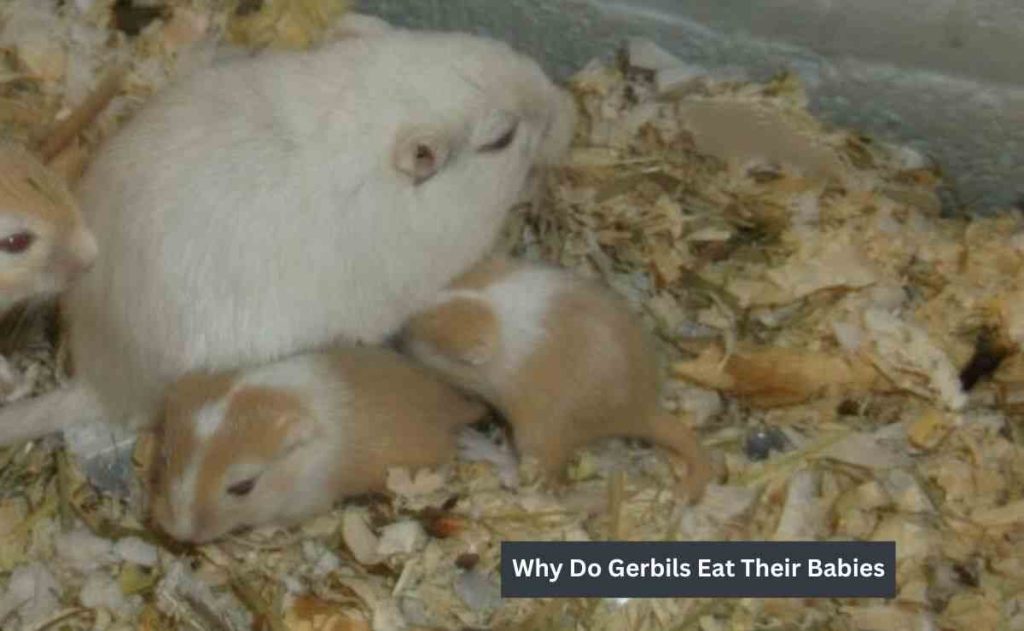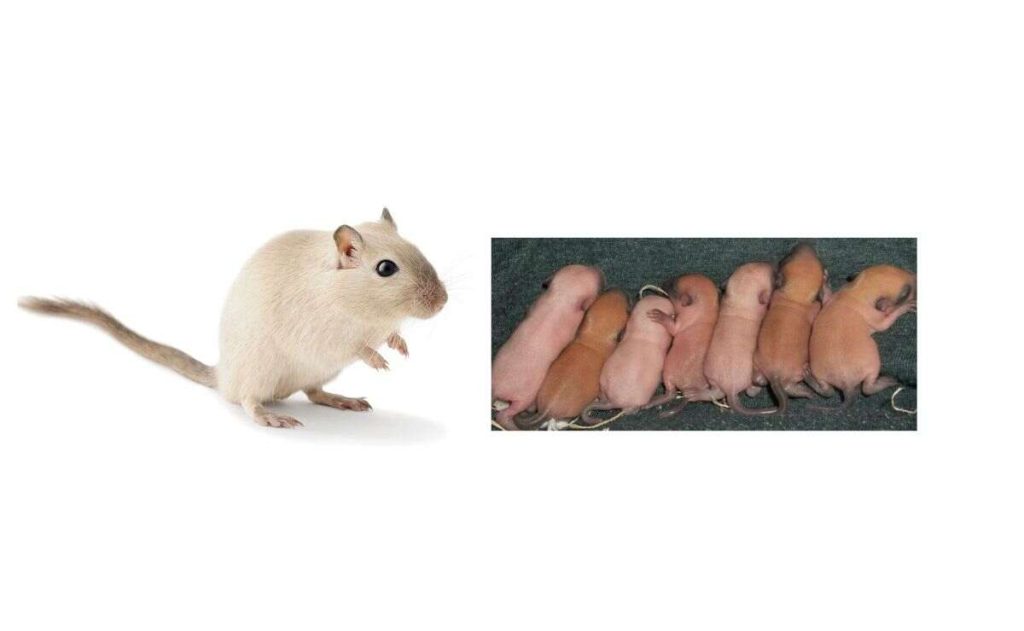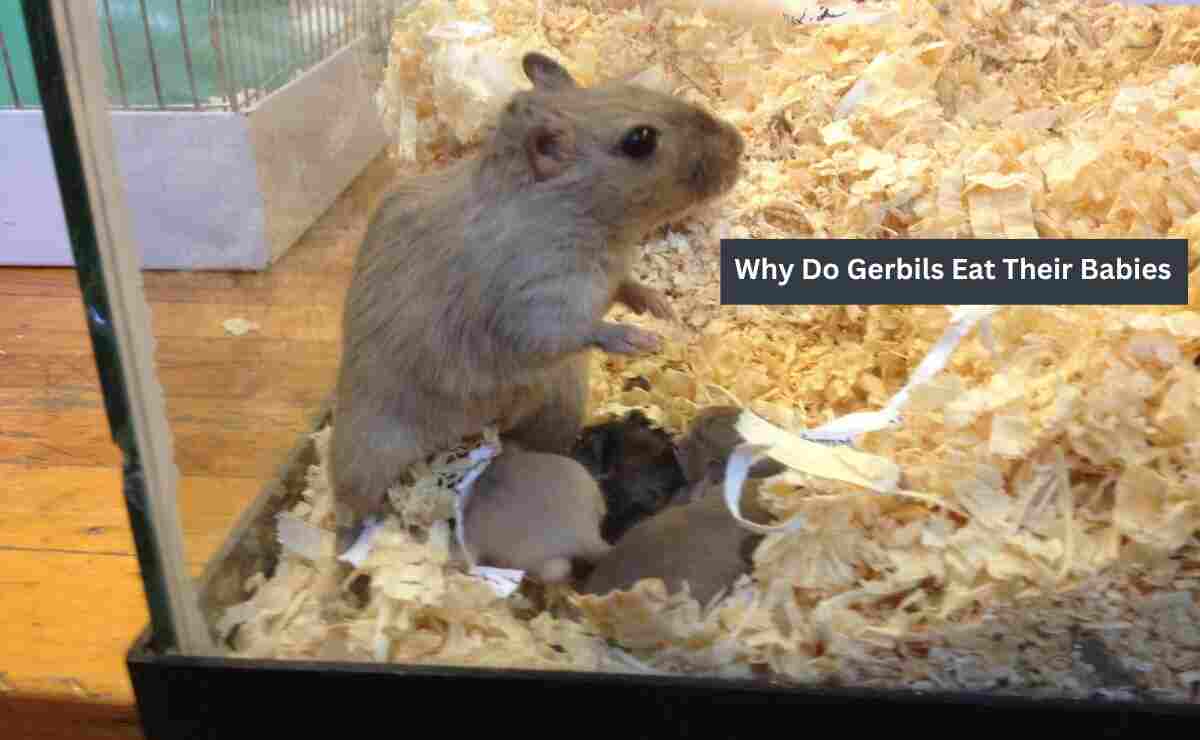It’s hard to believe but true that mother gerbils eat their own babies. This is kind of weird behavior. But the question is why do gerbils eat their babies?
There are various reasons. Sometimes the mother will eat her babies if they are injured or deformed, or if they are born unhealthy and do not have enough chance of survival. The mother may also eat her babies if there is overcrowding in the cage and there is not enough food to go around.
Why Do Gerbils Eat Their Babies?

It’s a stressful situation for the pet owners when gerbils eat their babies. However, there is a valid reason behind this act. Since every gerbil is different, their behavior is not equal. So we have made a list of the probable reasons and any of them can be responsible for this manner.
1. Large Litters
Gerbils usually have litters ranging from two to six young, but occasionally, a mother can give birth to more than she can handle in one goes. While the record for the largest gerbil litter is unknown, mothers can produce numerous offspring.
However, with a very large litter, the parents might find it overwhelming to properly care for all of them. This can lead to the mother and father culling one or two pups to make the remaining ones more manageable.
2. Too Many Babies
Gerbils are prolific breeders, and a mother often mates again soon after giving birth. So female gerbils have another litter once the first litter is weaned. While this maximizes the number of offspring produced, it can also result in overcrowding and inadequate resources.
The challenge of caring for a large number of babies is a common issue for female gerbils. These small rodents have only six nipples to provide nourishment for their offspring. As a result, the mother gerbil finds it necessary to reduce the number of pups she’s caring for.
Even if there are initially only six babies any that appear deformed or are in poor health are likely candidates for consumption. The mother gerbil’s primary concern is the well-being of her family, and she perceives these weak or sickly pups as a burden she can’t adequately attend to.
3. Cage Size Matters
One significant factor that can lead to a mother gerbil eating her babies is an inadequate cage size. Gerbils typically give birth to relatively large litters, often containing six or more pups.
When the cage starts to feel small and cramped due to the increasing number of pups, it forces the mother to take drastic measures, such as reducing the number of live babies. Providing a spacious cage is crucial to prevent this issue.
4. Lack of Nutrition
After giving birth, the mother gerbil creates a nest. She is dedicated to caring for her pups, providing milk, and maintaining the nest for the next week. While caring for her pups, the mother cannot easily access food. Her focus is primarily on looking after her young, and she must forego regular meals during this period.
In the wild, this situation can put the mother at risk of starvation. By consuming one or two of the pups, especially in larger litters, the mother can conserve her energy and ensure her own survival, as well as the remaining pups.
5. Abnormal Babies
Within a gerbil litter, there is a pup that is born smaller and less developed than the others. This can occur naturally, and the reasons are not entirely clear. The runt of the litter often faces challenges, as the stronger siblings bully it, taking its food and access to the mother.
In such cases, the mother’s instinct is to eliminate the abnormal babies and focus her efforts on nurturing the healthier pups. While it may seem harsh, this behavior is driven by the need to pass on strong genes and raise healthy offspring.
6. Bad Health of the Mother
Pregnancy and caring for young gerbils can be physically stressful for the mother. If she falls ill during this time, her ability to find food, stay active, or interact with other gerbils diminishes. In such circumstances, a lack of adequate nutrition leads to the mother consuming one of her pups.
7. Human Scent on Babies
When a gerbil mother gives birth, she gradually learns to recognize the unique scent of her newborns. Over time, she becomes familiar with this scent and readily accepts her offspring. However, problems can arise if you handle the babies and transfer your scent to them.
Soon mother gerbil becomes confused by the new smell on her young and forces her to eat them as she does not recognize the original scent of her offspring. To prevent this, it’s advisable to minimize handling of the babies, especially during the initial period after birth.
8. Extreme Stress
Stress can have profound effects on gerbils. Excessive handling, loud noises, overcrowding, and conflicts among group members can stress gerbils. In response to stress, gerbils can exhibit unusual behaviors like eating their young. To prevent this, it’s essential to address and mitigate sources of stress promptly.
9. Fear of Threats
Gerbils are highly sensitive social creatures, and when they are expecting babies, they become even more vigilant. Loud noises, such as those caused by taking pictures, can be perceived as threats by the mother gerbil.
To mitigate this, consider using a webcam for observation to minimize disturbances. Additionally, keep other pets away from the room where the pregnant gerbil is located, as the presence of other animals can cause stress.
10. Pup Already Dead
Sometimes, the pup is already deceased, either stillborn or due to illness. In such cases, the mother may consume the dead pup. This is a common occurrence, and large gerbil litters can compensate for such losses, ensuring a greater number of gerbils reach adulthood.
How To Prevent Gerbils From Eating Their Babies?

Eating the offspring can be distressing for gerbil owners, but there are steps you can take to prevent this behavior from occurring.
Firstly, you should make sure that the gerbils have a suitable habitat. You should provide a spacious and secure enclosure that includes an adequate nesting area that is secluded. Provide enough privacy for the mother and her young.
Furthermore, it is crucial to monitor the behavior of the gerbils during the breeding process. If there are signs of aggression or stress between the parents, it’s better to separate them to prevent any harm to the offspring.
Give the mother proper nutrition during pregnancy and lactation, as malnutrition can contribute to cannibalistic behavior. A balanced diet of high-quality gerbil food supplemented with fresh vegetables and fruits can help ensure the mother’s health and the survival of her young.
In some cases, the presence of other gerbils or outside disturbances can cause stress and trigger this behavior. It is advisable to keep the gerbil enclosure in a quiet and undisturbed area to minimize stress. Additionally, if you have multiple gerbil pairs, it is important to provide each pair with their own separate enclosure to avoid conflicts.
Finally, despite all precautions, if the situation occurs, you may need to intervene and remove the offspring from the parents. You can consult with a veterinarian or an experienced gerbil breeder for guidance and assistance in such situations.
Do Male Gerbils Eat Their Babies?
Yes, male gerbils can also kill or harm their offspring. If there are multiple gerbils in a group or cage, including rival males, a male gerbil can kill the offspring of rival gerbils. This behavior can be driven by competition for resources, territory, or the opportunity to mate with females.
This behavior can be observed when a male wants to bring the female back into heat. By doing so, he can then mate with the female again and do the production of another litter.
Final Words
Gerbils are generally caring parents, but this cannibalistic behavior can occur due to various situations.
You can minimize it by creating a more comfortable and secure environment for your gerbil family. It will reduce the chances of the mother eating her babies.
